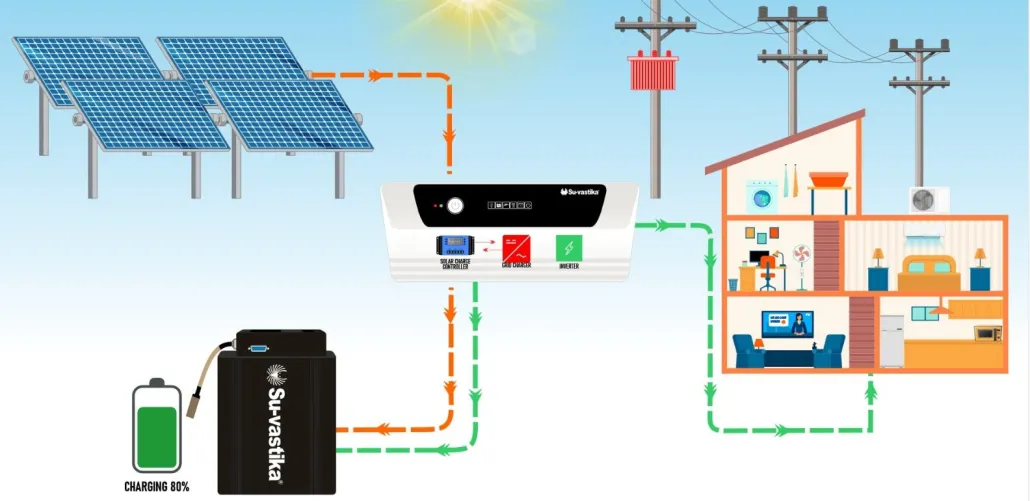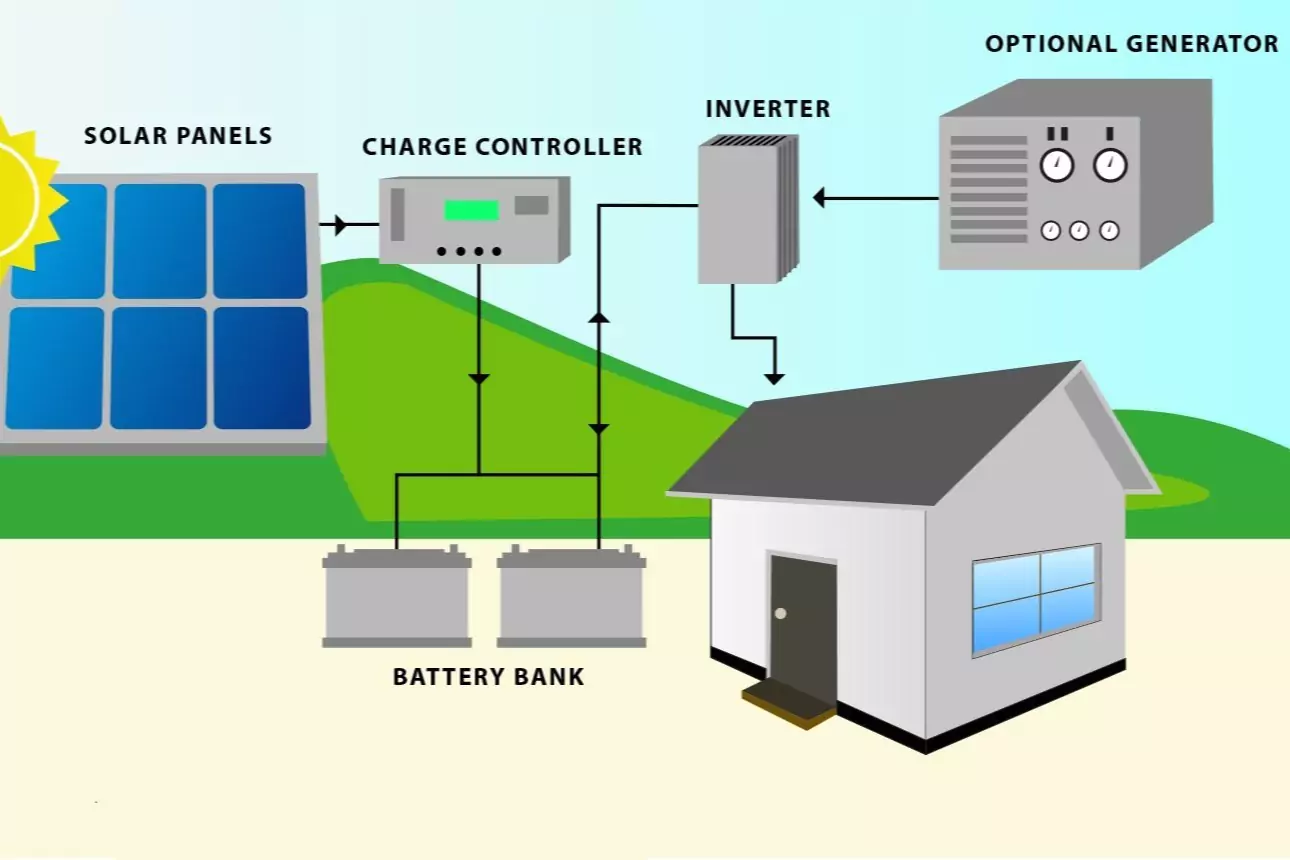Off-Grid Solar Systems
PRODUCT & SERVICES
NEED HELP
Our Client care managers are on call 24/7 to answer your questions representative or submit a business inquiry online.
+91 9978909587
QUICK ENQUERY
Off-grid solar systems Best Solar Energy Company in Gandhinagar

Best Solar Energy Company in Gandhinagar, An for the home, location where the electricity is not available is a solar energy system that is completely independent of the electric grid /power plug. It is designed to provide all the energy needed for a home & such locations where the electricity is not available, including electricity, hot water, and space heating. The system consists of solar panels, an inverter, a charge controller, batterie bank, and other necessary equipment.
Solar panels capture energy from the sun and convert it into direct current (DC) electricity. The inverter converts the DC electricity into alternating current (AC), which is used to power appliances. The charge controller regulates the flow of electricity from the solar panels to the batteries, ensuring that the batteries are not overcharged. The batteries store the excess electricity for use when the sun is not shining.
What is an Off-Grid Solar System and How Does It Work?
An Off-grid solar systems is a type of solar energy system that is not connected to the electrical grid. Instead, it uses solar panels to capture and store energy from the sun, which is then used to power your home or business. Off-grid solar systems are ideal for those who live in remote locations.
An off–grid solar system is an independent power system that operates without being connected to a utility grid. It is usually composed of photovoltaic (PV) solar panels, a charge controller, batteries, an inverter, and other necessary components. Off-grid solar systems are typically used in remote locations where utility grids are not available or reliable, such as in rural and remote areas, or in places with extreme weather conditions.
Off-grid solar systems work by converting sunlight into electricity through the use of PV solar panels. The panels are connected to a charge controller that regulates the amount of power being generated. This power is then stored in batteries for later use. The output from the batteries is then sent to an inverter, which converts the stored energy into usable electricity for powering appliances and electronics.
Best Solar Energy Company in Gandhinagar,Off-grid solar systems provide many benefits, including energy independence, environmental sustainability, and cost savings. They are also an ideal solution for homeowners who live in areas not serviced by utility grids. With an off-grid solar system, homeowners can generate their own power, eliminating their dependence on the utility grid and reducing their electricity bills. Additionally, off-grid solar systems also reduce the amount of air pollution because they generate power without burning fossil.
Benefits and Drawbacks of an Off Grid Solar System
An off grid solar system is a type of solar energy system that is designed to run independently from the grid. It provides clean, renewable energy and is a great alternative to traditional energy sources. However, there are both benefits and drawbacks to having an off grid system. The primary benefit of an off grid solar system is that it provides a reliable source of energy that is not dependent on the grid. This allows homeowners to be independent of their local utility company and saves them money on electricity bills. Additionally, off-grid systems are relatively easy to install and maintain, making them suitable for remote or rural areas.
The primary drawback to an off grid solar system is its cost. Even though it can save money in the long run, the upfront costs can be quite high. Furthermore, since the system does not rely on the grid, it requires batteries to store energy for use during non-sunlight hours, which adds to the cost. Additionally, since the system does not rely on the grid, it can be difficult to predict how much energy will be available, making it difficult to plan for energy needs.
In conclusion, an off grid solar system can be a great alternative to traditional energy sources, but it is important to weigh the benefits and drawbacks before making a decision.
Off grid solar power system with battery Backups
Another important part of Off-grid solar systems is the ability to regulate the energy supply. This can be done with inverters, which convert DC power from the battery storage system into AC power for use in the home. Inverters also allow for energy to be directed from the battery to solar panels or other energy sources as needed.
Finally, off-grid systems may require additional energy sources, such as generators or fuel cells, to supplement the battery storage system. Such sources may be necessary in order to meet peak energy demands or to provide additional power in the event of a power outage.
Overall, battery storage and backup solutions are essential to the successful operation of Off-grid solar systems. They provide an effective means of storing energy, regulating the energy supply, and providing additional energy sources when needed. As such, they play an important role in ensuring reliable energy access for those living Off-grid solar systems.
Benefits of using off-grid solar panel systems for home
Best Solar Energy Company in Gandhinagar,Off-grid solar panel systems offer a number of important benefits for homeowners. First and foremost, they provide renewable energy that is free from utility companies, allowing homeowners to save on their electricity bills. Off-grid systems also provide a much more reliable source of energy, since it is not affected by power outages or other disruptions to the grid. Additionally, the use of solar panels can help reduce environmental impact, as solar energy does not release any harmful emissions. Lastly, off-grid solar panel systems are low maintenance.
Best Place to install a solar system for your home
The best place to install a Off-grid solar systems for your home is on a south–facing roof that is unshaded for most of the day. The roof should have a tilt angle of approximately 30–45 degrees to ensure the most effective capture of sunlight. Additionally, it is important to ensure that the roof is structurally sound and capable of supporting the weight of the system. Finally, it is important to check with local laws and regulations to ensure that the installation of the system is in compliance.
Why choose us?
- Gujarat’s Most Trusted brand
- #1st leading Solar Rooftop EPC Company for 10 years
- Govt. Presence & Recognitions
- 7000+ residential systems commissioned
- 10+ years of experience
- 25 MW+ of installations & services
- 24X7 service support,
- complete peace of mind with in-house service support
- 5 Star rated
FAQ
The answer to which is a better on-grid solar or off-grid solar depends on a variety of factors, including the specific needs of the user, the availability of resources, and the cost of installation. On-grid solar systems are connected to the local electric utility grid, meaning that the energy generated is used to offset the amount of energy drawn.
An off–grid solar system is a great option for those who want to save money on their electricity bills. Off–grid solar systems can provide a reliable and sustainable source of energy for those who are not connected to the main power grid or who live in remote areas. By using solar energy, you can produce your own electricity and reduce or even eliminate your electricity bills.
Off–grid solar systems are an increasingly popular way to provide energy to homes, businesses, and other locations. However, these systems can present several challenges. One of the main challenges is the cost of installation and maintenance. Off–grid systems require significant upfront investment and have a longer payback period than grid–tied systems. Additionally, the components of an off–grid system require regular maintenance and replacement, which can be costly and difficult for some locations. Furthermore, because off–grid systems are not connected to the grid, they are typically limited to the energy production of their own components, meaning that if there are long periods of cloudy or rainy weather, the system may not be able to produce enough energy to meet the needs of the location. Finally, off–grid systems often require more complex and specialized knowledge to operate, which can be difficult to find in some more remote locations.
An off–grid solar system is designed to last for many years. With proper maintenance and care, the system should last at least 15 to 20 years. The system’s performance will depend on the quality of the components that were used to build it, how well the system was installed, and how well it is maintained. Regular inspections and cleaning of the solar panels are recommended to ensure the system is functioning optimally. Additionally, the battery bank should be replaced every 5 to 8 years to ensure the system remains reliable and efficient. With proper care and maintenance, an off–grid solar system can last for decades and provide clean energy for many years to come.
The hardest question about space is undoubtedly “what is the meaning of life?” This question has been pondered by philosophers and scientists alike, and it is one that has no definitive answer. Space exploration has given us a better understanding of the universe and our place within it, but it has not been able to answer this age-old question. It is impossible to know what lies beyond our current understanding of the universe, and the meaning of life is something that may never be fully understood.

Ready to Transform Your Business with Solar Energy? Contact Kotson Energy Today!
Discover the economic and environmental benefits of commercial solar solutions with Kotson Energy. Contact us today to schedule a consultation and embark on a sustainable energy journey that aligns with your business goals.
